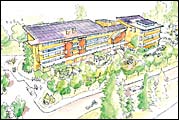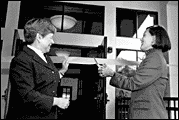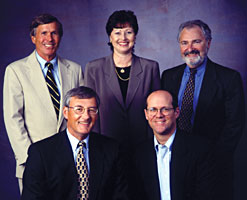|
 |
|
 |
 |
Foundation Activities - Grants
We made grant payments of $4,594,830 through our program areas.
| Environmental |
17 Grants |
$ 399,000 |
 |
| Kirsch Investigator Awards |
8 Grants |
1,440,000 |
 |
| Medical/Science Projects |
4 Grants |
360,000 |
 |
| Political Reform and Global Issues |
6 Grants |
575,000 |
 |
| Silicon Valley Communtiy |
64 Grants |
1,169,580 |
 |
| Discretionary |
24 Grants |
651,250 |
 |
Summary
As part of our continuing evolution as a new Foundation:
- We honed the focus of our Environmental Grants Program to complement and augment our advocacy of clean air.
- We identified and funded key initiatives in political reform (efforts to reform the U.S. election process in light of the 2000 Presidential election) and nuclear disarmament (an alternative nuclear posture review for the new Presidential Administration to consider).
- We designed and began to implement a creative model for funding medical science research that builds on our risk-taking approach and leverages our limited resources.
- We demonstrated our continued commitment to Silicon Valley, our local community, with substantial operating support and capital and program funding.
Major Grants
Four grants are representative of significant Foundation initiatives during the year:
Catalyst for a Cure
In a joint venture with the Glaucoma Research Foundation, we launched a new model for medical research project funding: collaborative funding for collaborative research teams. After months of discussion and research, the Foundation’s Board adopted this new model in order to meet two key objectives: leverage of our financial resources and a keen focus on determining and then meeting measurable outcomes. We believed that research into glaucoma, a debilitating eye disease, would benefit from bringing new researchers into the field. We were pleased that the Glaucoma Research Foundation, a leading funder of research in the area, agreed with our ideas and became our partner in this new, creative research approach.
Kirsch Center for Environmental Studies – DeAnza College
 |
| Artist’s rendering of the planned, environmentally-friendly Kirsch Center. |
|
To further our environmental goals, to establish a model project, and to support our local community and its residents, we made a $2 million grant to De Anza College to initiate its campaign to construct the first-ever "green building" on a community college campus. This landmark Center will also be the first of its kind on any college campus west of the Mississippi.
Some of the environmentally-friendly design specifics the Kirsch Center will incorporate are: passive solar orientation and photovoltaic (PV) panels for energy production, natural day-lighting and ventilation, recycled steel, certified sustainable wood products, electric vehicle recharging stations and a pollution prevention and waste management plan. Equally important, we know that other educational and governmental leaders will become educated on the use of renewable and energy-efficient technologies in buildings, thus leveraging our grant.
Mills College – Kirsch Building at Education Complex
 |
| Mills College President Janet L. Holmgren (on left) with Michèle Kirsch at the ribbon-cutting ceremony for the Kirsch Building. |
|
As a graduate of Mills College and a strong proponent of quality education, Michèle Kirsch made a $1 million contribution to the College to advance its highly regarded teacher preparation program. Each year, 150 graduate students work toward a teaching credential, Master’s degree or Doctoral degree in education. The new, three-building Education Complex opened in April of 2000. The Kirsch Building, already in use, houses the classrooms and faculty offices of the Education Department.
ACLU Foundation of Florida – The Florida Project on
Equal Voting Rights
Given our democracy is based on "one person, one vote" and our political system requires reform to ensure that elected and appointed officials are accountable to the people, we made a $300,000 grant to the ACLU. Its purpose was to seek changes in the Florida voting system to guarantee that the right to vote and the right to have one’s vote accurately recorded and counted are respected.
Following the November 2000 election, the Florida ACLU received numerous complaints that there were efforts to intimidate voters, that voters were not allowed to vote if they did not produce two picture identifications and that the names of registered voters were missing from the official voter rolls. The ACLU has been working with the state legislature and through the courts to reduce racial and other disparities that were evident and to establish standards for recounting disputed ballots and procedures for processing absentee ballots. With the nation’s attention focused on Florida in the aftermath of the 2000 election, we expect that the successes of the Florida ACLU will lead to similar changes in other parts of the U.S., thus leveraging our resources.
 |
| Kirsch Foundation Board and Officers: (top row, left to right) Peter deCourcy Hero, Secretary; Kathleen Gwynn, President/CEO/CFO; Harry J. Saal, Vice-Chairman. (Bottom row, left to right) Perry Olson, Vice-Chairman; Steven T. Kirsch, Chairman. |
|
|
|
|
|
|
